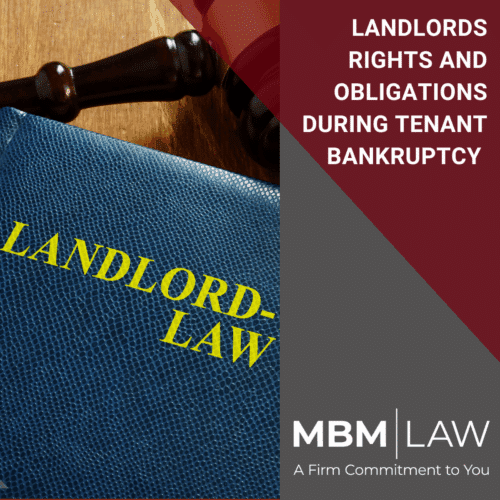When your Pennsylvania tenant files for bankruptcy, it can afford them significant rights and protections related to their lease, and in turn raises complex legal challenges for the protection of your rental income and rights to the property. As a landlord, understanding your legal rights and options is critical to protecting your investments and minimizing delays or losses. With informed legal counsel, you can navigate the bankruptcy process, enforce lease obligations, and preserve your property interests.
How a Law Firm Can Help with Tenant Bankruptcy
A landlord’s rights and responsibilities during a tenant’s bankruptcy are highly nuanced. The specific rules can vary significantly depending on the jurisdiction and the details of the case. The best way to protect your financial interests and ensure compliance with the law is to seek professional legal guidance.
For experienced assistance with tenant bankruptcy and landlord rights in Pennsylvania, contact a local law firm.
Automatic Stays Under Bankruptcy Law
As soon as a tenant files for bankruptcy, an automatic stay goes into effect. This stay significantly limits the actions that that person’s creditors (including their landlord) are permitted to take, but certain obligations remain in effect and can be enforceable.
What a Landlord Cannot Do During an Automatic Stay
- Send the tenant a demand or default letter
- File an eviction action to remove the tenant
- Sue the tenant outside of bankruptcy court for previously unpaid rent
During a stay, no actions can be taken to enforce rights against the tenant or the property they are occupying without the bankruptcy court’s approval. This includes any attempts to collect debts that were accumulated before the bankruptcy petition was filed. Violating this can result in significant financial consequences. But there are certain actions a landlord can take that will not violate the rules of this stay.
What Can a Landlord Do During an Automatic Stay
During a stay, a landlord CAN:
- File a proof of claim in bankruptcy court. This notifies the court and tenant of the amount a certain creditor is owed.
- Sue a lease guarantor for past rent/other amounts owed. Unless the guarantor has also filed for bankruptcy, the tenant’s automatic stay does not extend to them.
- Expect a timely payment of all rent that accrues after the bankruptcy petition was filed, if the tenant intends to remain on the property.
- Note that this does not necessarily apply to debts that were due after the date of the petition filing, only ones that accrue/are created after that date.
- Depending on the jurisdiction, expect “stub rent” – a fraction of the rent from the month in which the petition was filed.
To ensure that post-petition debts are paid, a landlord should closely monitor a tenant’s bankruptcy case, and keep track of what debts are created after their petition has been filed. If these debts are not paid, a landlord must ask the bankruptcy court’s permission before pursuing potential remedies, such as receiving relief from the stay or evicting the tenant in an expedited process.
If the tenant is granted bankruptcy, they will generally have three options to choose between: assume the lease, assume and assign the lease, or reject the lease.
Assuming the Lease
If the Pennsylvania tenant assumes the lease, they wish to stay in possession of the property. This will require that the tenant cure all monetary defaults and non-monetary defaults in full, compensate the landlord for losses suffered (potentially including attorney fees), and demonstrate to the landlord that it is reasonably likely they will be able to fulfill all future lease obligations.
The timeline in receiving compensation for defaults and losses may vary – most bankruptcy courts will require that this happens within two years, but some may require that it happens immediately upon lease assumption.
Assuming and Assigning
With this option, the tenant will still be obligated to pay all pre-petition debts, but may at that point have a third party step in to satisfy all their obligations going forward.
Rejecting the Lease
This option is not a lease termination, but does constitute a breach of lease. This is the outcome that Pennsylvania landlords generally attempt to avoid, because of the limited possibilities for loss recovery. The landlord can make a “rejection damage” claim, but because these claims are considered pre-petition debts, they are low priority, and are capped at a maximum of either one year’s rent, or 15% of rent for the remaining lease term not exceeding two years (whichever is greater). To minimize risk and damages, landlords should keep certain issues in mind in this process:
- Understand the effective date for a lease rejection
- Once courts approve a rejection, they may be able to operate it retroactively, making it apply as far back as the bankruptcy petition date. If the tenant was still operating on the premises after that petition date, the landlord may be able to oppose this, and receive rent for that period and be paid ahead of other creditors.
- Properly file claims, including:
- Pre-petition claim for all amounts prior to filing
- Post-petition claim for amounts between filing and rejection of lease
- Rejection claim for amounts between rejection and end of lease
- Inspect the space – requesting an inspection prior to lease rejection can allow for higher priority of claims based on damages caused by the tenant’s use of the space
- Negotiate side letters – legal counsel can help a landlord to negotiate terms related to going-out-of-business sales and property damages that may impact their claims
- Secure the space – gain HVAC, security codes, and keys as quickly as possible
Protect Your Rights: Hire an Experienced Law Firm
A key step is to engage legal counsel to handle the filing of motions, attend court hearings, negotiate with trustees or debtors, and ensure compliance with bankruptcy and lease law to safeguard your rights efficiently. While your tenant gains protections under the automatic stay by filing for bankruptcy, landlords maintain important rights, as well. The attorneys at MBM Law are experienced in helping preserve revenues and asset conditions during tenant bankruptcies.

Lawrence Maiello serves individuals, families, and business owners in the preparation of a wide array of estate planning documents, wills, and trusts. Lawrence leads MBM Law’s Real Estate practice, having specialized in the industry for over three decades. He possesses substantial experience with commercial, residential, and mixed‐use real estate developments. He has been recognized as both a Pennsylvania Super Lawyer® and a Best Lawyer in America® for Real Estate Law.

